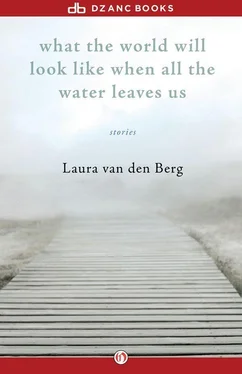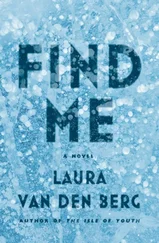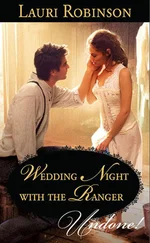The woman invited them inside, her French marked by an unfamiliar inflection. The house was small and low-lit. Juliana smelled rosemary and bread. The woman showed them to a rectangular wooden table, where she served herbal tea in clay mugs. The cups were shallow and Juliana finished her tea quickly.
“Leon,” the woman said. “Are you still wearing the skeleton mask?”
“I haven’t given it up yet.”
“Keep going through the fall,” she said, “And you will see something remarkable.”
“The weather is very hot now,” he replied. “The tourists stand around like dazed cattle. Few people give me money.”
“Bear it,” the woman said. Then she set aside her cup and smiled at Leon, showing crooked and stained teeth. He glanced at Juliana and nodded.
She produced three large stones from her pockets. They were inky and smooth, as though they had spent years in a riverbed. The woman made a triangular shape with the stones and covered them with her hands. Juliana nudged Leon underneath the table, but he just sat there with his arms crossed, staring at the woman and her bean-shaped stones.
The woman reached for Juliana’s hand. She pressed her thumb against the red mark on her palm.
“From the poppies,” Juliana explained.
The woman held onto her hand and began speaking in a dialect Juliana could not translate. She lowered her head and rounded her shoulders. Juliana felt heat entering her body; she imagined the woman peeling back her skin and studying the geography beneath. She did not pull away, too surprised for a struggle. When she asked Leon what was happening, he shook his head and brought a finger to his mouth. She was disturbed by her inability to comprehend the woman’s language — I can’t understand you, she wanted to shout — but the feeling of being shut out, of being unable to interpret, was also somehow familiar. The woman squeezed her hand harder, pressing the slender bones in her fingers together. She pursed her lips and hummed. It frightened Juliana to be dominated in this way, but a part of her wanted the woman to keep her pinned to the table, to dictate her next movement, and she felt a shiver of disappointment when her hand was finally released.
Juliana rested her elbows on the table and stared into her mug. She interlaced her fingers; her hands were hot and moist. The door was cracked open and warm air flowed into the house, the sunlight making a pattern on one end of the table that reminded her of Cole’s equations, the bands of signs and symbols. After giving herself a moment to settle, she stood to leave and Leon placed a hand on her knee.
“Not yet,” he said.
She returned to her chair. They sat in silence a little longer, then the woman reached into her pocket and gave Leon an old-fashioned iron key. He took it and thanked her. “Nothing is waiting,” the woman said to Juliana in her accented French. She did not make any other gestures toward her before they left the house.

Juliana and Leon walked half a mile down the road and entered a garden. A low, rocky hill stood behind the foliage. They followed a gravel path, passing thickets of lavender and oleander before reaching a bench at the bottom of the hill. To the left, purple geraniums concealed their view of the road; on the other side, rows of Italian cypresses and sage-colored olive trees.
“Want to sit?” He pointed at the bench.
“All right.” The wood was cool against her legs. Leon did not join her, instead standing in the shadow of a tree. “What language were you speaking back there?” she asked.
“A dialect from the Camargue region,” he replied. “Where she’s from.”
She had read a little about Camargue, the marshes and pink flamingos and ranches that bred white horses. “Is that why we really came all the way out here?” She picked at the moss growing on the bench. “To see that woman?” She thought of how soothing the warm sand of a beach would feel right now, of leaning back and planting her elbows in the ground and looking out at an endless span of blue.
“That was one reason,” he replied. “But there’s something else.”
She looked at him. “Well?”
He smiled. “Shall we go to the cave?”
She followed him to the hill, ducking underneath low-hanging branches. An arch had been carved into the rock, the entrance covered by a steel gate. Vines dangled in front of the bars like tentacles.
“The town installed this last year.” He unlocked the gate with the key the woman had given him. “To protect the inside of the cave.”
He stepped inside, leaving the gate open. Sunlight brightened the pale walls. The cave was much longer than it appeared from the outside. The light began to disappear as they went deeper and soon they were in total darkness.
“We’re getting close now.” A tiny beam appeared in his hand — a flashlight the size of a pen.
“How long have you known the woman we visited?”
“For years. My family vacationed in this part of France when I was a boy.”
“Exactly what does she do?”
“She lives near the sea and goes to the garden. She collects those stones you saw and tells people about themselves. My mother used to visit her every summer, always on the first day of June, before she died. Her drowning was predicted one year before it happened.” Leon stopped and faced the wall, then moved the light around. She was watching the beam slide across the stone when she saw a dark shape: a sketch of an animal, a horse or a cow.
“There.” He pressed his hand against the wall. “This is what we’ve been looking for.”
Soon the light revealed a black outline — yes, it was a horse — and three mountain peaks, the rock underneath shaded faint yellow and blue. The drawings were small, no larger than her fist. She stepped closer to the wall. “How old are these?”
“Thousands of years,” he replied. “They were discovered by a group of geologists last spring. Scientists have come all the way to Marseille to study them. Another group is scheduled to return this summer. But my friend has a key. I don’t know how she got it. She lets me use it whenever I like.” He passed her the flashlight. “Here,” he said. “See for yourself.”
The coarse grain of the rock rose through the color, giving the drawings texture and ripeness. Occasionally the borders faded and it was difficult to tell where the shapes began and ended. She wondered what was supposed to be at the bottom of the mountains — a pool of water, perhaps. Was the dry land she had seen from the road once a sea? She heard Leon clear his throat and move away from the wall. She turned and aimed the light at him.
“What did the woman tell you?” she asked. “What did she say when she took my hand?”
“That she could see everything inside you,” he said. “And then she told me what was there.”
Juliana didn’t press any further. She wasn’t at all sure she wanted to know what was inside of her.
“You don’t have to think about this now.” He touched her elbow. “Just keep looking at the cave.”
She pointed the light at the wall, the white circle falling on the horse. The neck was craned slightly and she could imagine the animal standing alone in a field, the intuitive angle of the head. She thought of the centuries that were contained here, the evidence of so many lives. She touched the stone and rubbed the damp grit between her fingertips.
For a moment, she returned to the apartment in Paris, to her husband standing in the kitchen, washed in the bluish light of evening. He was hunched over the sink, his hands gripping the edges of the counter. They had been arguing. She had been pushing him to get help and, in a flurry of desperation, even suggested they return to the States. She knew some kind of end was near. They had stumbled onto a path and moved too far, the ground now irretrievable. Sweat had bled though his white dress shirt, forming a pattern along his spine that resembled a ladder. He reached into his pocket and took out a ribbon of paper. Look at this, he told her, and tell me what it says to you. She had taken the note and stared at the jumble of numbers and told him it meant nothing. Nothing to her, nothing to anyone. Her marriage ending was not a shock; it was the spectacular strangeness of it that had left her staggering. She had been an ordinary person with an uneven marriage and a good job and the occasional adventure, unprepared for this life of peculiar and slippery grief.
Читать дальше













